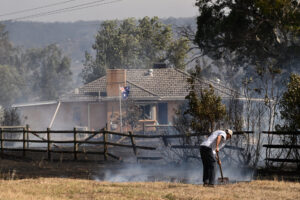Articles & Opinions
The beatings will continue until social cohesion improves
This week, Australia rolled out the red carpet for a world leader who has been accused of inciting genocide, while NSW police were caught on camera bashing people protesting against genocide.
Lightweight Libs have Labor laughing all the way to an early election
In five days, Anthony Albanese will become Australia’s longest-serving prime minister since John Howard.
This is not ‘social cohesion’ – it’s just a tighter net to trap us all
Australians have been lectured a lot in the past couple of years about social cohesion, but it reached a fever pitch this week in response to protests against the visit by Israel’s head of state.
‘Disunity is death’ – but Labor’s cowed caucus has a cost too
The first Labor national government anywhere in the world was elected in Australia in April 1904.
January 2026 Media Highlights
Our first month of 2026 was an eventful one!
January 2026
Algorithms are a problem for Australian music
Last weekend, music fans across Australia tuned into national youth music station Triple J for the 33rd annual Hottest 100.
Clowns to the left of us, jokers on the right – and voters stuck in the middle
We are about to head back into parliament – and the sitting year proper – with one of the major parties again focused on itself, and the other doing all it can to ensure the focus remains on its rivals.
Beware the new ‘normal’, it might be about to bite us
Anyone interested in politics would have heard the paraphrased Plato quote at some point – “one of the penalties of refusing to participate in politics is that you end up being governed by your inferiors”.
Play stupid games, win stupid prizes. Why we’re all the losers from the hate speech fracas
The biggest loser in the political brinkmanship Anthony Albanese and Labor lured Sussan Ley and the Liberals into with the hate group legislation no one wanted is, as always, the public.
No signs of heat going out of Coalition’s summer of discontent
Sussan Ley started 2026 much like she ended 2025 – extending her tenuous hold on the Liberal Party leadership by politicising tragedy.
Australia is one of the richest countries in the world. Our governments act as if we are poor
Australia’s health system is in crisis and, while the tensions over funding between state and territory leaders and the Commonwealth is at an all-time high, people desperately waiting for medical help need real action, not performative posturing.
Burning homes and rising premiums: why fossil fuel companies must pay the bill
Another summer, another round of devastation: homes lost, communities evacuated, lives upended.
Social media has destroyed my focus, concentration and free time. Can I opt into the ban?
The first thought I had when the Albanese government’s under 16s social media ban was announced was: “Can I opt in?”
December 2025
Australian hearts are shattered – and some would-be leaders have broken them further
There is no denying Australia’s sense of safety has been shattered. There is no denying antisemitism exists in Australia and that the fears of the Jewish community have been horrifically realised in a way that perhaps we will never recover from. There is no denying that in the days and months to come we will
The stark reality we need to face about guns in Australia
The horrific anti-Semitic terrorist attack in Bondi, the most deadly mass shooting since the Port Arthur massacre thirty years ago, makes gun law reform in Australia necessary. Suggestions from former prime minister John Howard and others that gun law reform is just “a distraction” are cynical in the extreme. Precisely no one is suggesting gun
2025 Year in Review
It’s been a massive year for everyone here at the Australia Institute, and we couldn’t have done it without you!
The welfare system isn’t just on fire, it’s burning out of control
The problem with having pattern recognition is that you can always see the fires before they start.
Liberals twist RBA remarks to sell a false narrative on public spending
Last week the Liberal Party shamefully misquoted the head of the Reserve Bank in a weak attempt to justify its criticism of government spending.
The great gas rip off: how the government can stop us all getting burned
The Albanese government could soon intervene to start fixing one of the biggest ongoing public policy fiascos in this country’s history: Australia’s rampant, uncontrolled gas export industry.
Why your Spotify Wrapped probably doesn’t have any new Australian music on it
Thursday was Spotify Wrapped day, when people around the world, like kids following the latest playground craze, shared their “top five” list.
When ‘common sense’ cuts are code for a cruel con job
The greatest trick neoliberalism ever pulled was convincing people government intervention shouldn’t exist.
Turnbull was right – but it’s government that really matters
On the eve of his defeat as Liberal Party leader in 2009, Malcolm Turnbull gave an interview to press gallery legend Laurie Oakes that still shocks hardened political watchers today.
November 2025
November 2025 Media Highlights
November was a busy month at the Australia Institute!
Joint statement: Australia’s national environment laws
We are Australians that dearly love the land, water, wildlife, and culture of our great country. We are committed to communities having a fair go, to openness in decision-making and to having our voices heard on decisions that affect us. We are committed to the wellbeing of this generation and future generations – and to
Only thing standing in way of gambling reform is government’s cowardice
Australians are the world’s biggest losers. Last year, Australians lost $34.8 billion in bets. That’s more than Australian households spend on electricity and gas ($29.5 billion) or alcohol ($26.8 billion) – so it seems safe to say we have a problem.
Australia’s health system is in intensive care, and the GST flatline is to blame
Australia’s health system needs intensive care, and so does the tax system that funds it.
Power for its own sake, and to hell with courage – Labor has lost its way
In 1963, Arthur Calwell published Labor’s Role in Modern Society, his 190-page treatise on his political party and Australian politics.
Who needs world-changing, life-saving science when you’ve got rugby league?
If you’ve ever used Aerogard, the announcement this week that CSIRO would cut another 350 jobs should alarm you.
The Wage Price Index shows pay packets are up. So why doesn’t it feel that way?
The latest figures from the Australian Bureau of Statistics show wages are growing at a reasonable rate, but a deeper look shows a big problem might be about to bite Australian workers.
Why it’s the perfect time for the Albanese government to defy the mining lobbies
Everybody knows the Albanese government has it easy in Parliament.
General Enquiries
Emily Bird Office Manager
mail@australiainstitute.org.au
Media Enquiries
Glenn Connley Senior Media Advisor
glenn.connley@australiainstitute.org.au





























